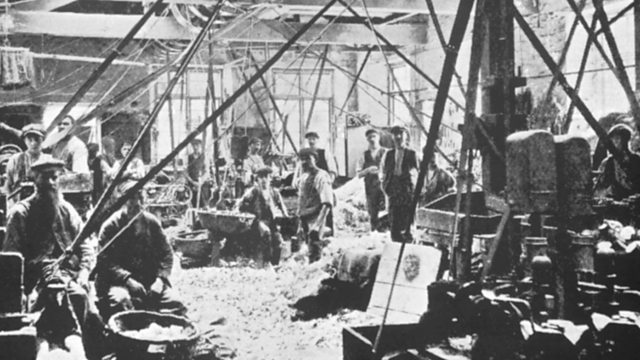Ulverston, Cumbria: Stott Park Bobbin Mill
Turning coppiced wood into hand grenade handles for the war effort
Cumbria was ideally placed for a thriving bobbin mill industry; the abundant running water, coppiced woodland and proximity to the cotton mills of Lancashire kept them very busy. Stott Park Bobbin Mill near Ulverston began working in 1835 and employed twenty men and six boys.
With the beginning of World War One orders began to flood in for the cotton reels, which had been the bread and butter of their business, but also for unusual things like rungs for rope ladders for The Royal Navy, handles and shafts for the tools to dig the hundreds of miles of new trenches on the Western Front, and for the handles for hand-grenades.
The local coppiced trees provided ash and birch wood, and the bobbins were turned on lathes while the timber was still full of sap, because it was easier to work with and the risk of a fire was reduced. The shavings didn鈥檛 go to waste either because they fuelled the steam engine that ran the belt driven machines in the workshops.
We take for granted the use of plastic nowadays, but a hundred years ago wood was the material of choice for handles, toggles and reels of all shapes and sizes. Without these unsung heroes the looms of the Empire would have become eerily silent overnight.
For an idea of the scale of cloth production in the run up to WW1; Oldham alone had twenty million spindles in operation, and these wove the cloth for the uniforms of Kitchener鈥檚 new army.
Location: Ulverston, Cumbria LA12 8AX
Image: Bobbin Mill lathe shop, courtesy of English Heritage London
Duration:
This clip is from
Featured in...
![]()
麻豆社 Radio Cumbria—World War One At Home
Places in Cumbria that tell a story of World War One
More clips from World War One At Home
-
![]()
The loss of HMY Iolaire
Duration: 18:52
-
![]()
Scotland, Slamannan and the Argylls
Duration: 07:55
-
![]()
Scotland Museum of Edinburgh mourning dress
Duration: 06:17
-
![]()
Scotland Montrose 'GI Brides'
Duration: 06:41







